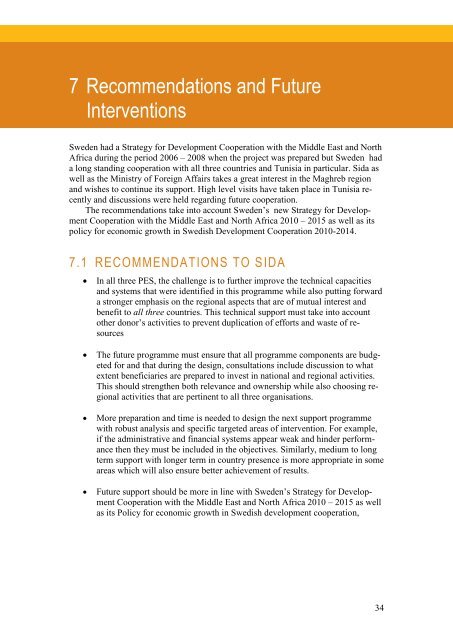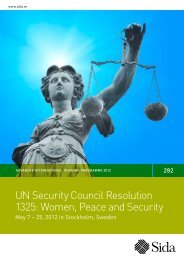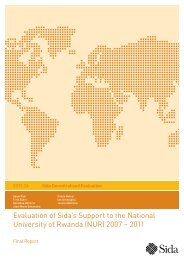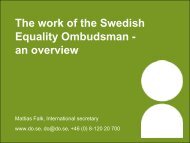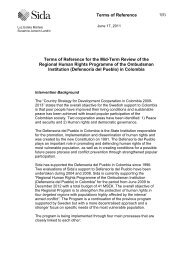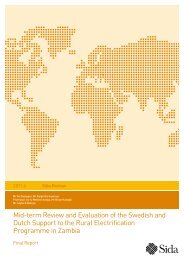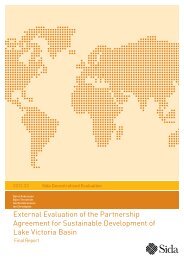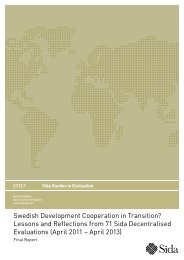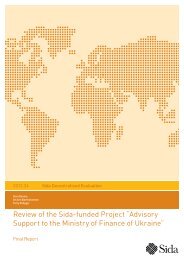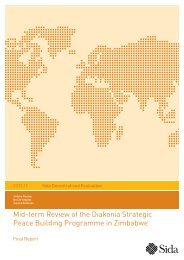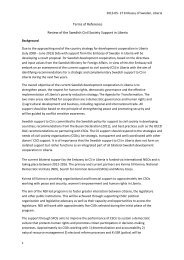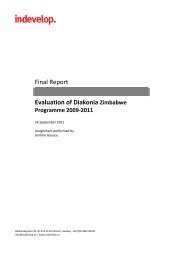Evaluation of the Maghreb Regional Training Programme - Indevelop
Evaluation of the Maghreb Regional Training Programme - Indevelop
Evaluation of the Maghreb Regional Training Programme - Indevelop
Create successful ePaper yourself
Turn your PDF publications into a flip-book with our unique Google optimized e-Paper software.
7 Recommendations and Future<br />
Interventions<br />
Sweden had a Strategy for Development Cooperation with <strong>the</strong> Middle East and North<br />
Africa during <strong>the</strong> period 2006 – 2008 when <strong>the</strong> project was prepared but Sweden had<br />
a long standing cooperation with all three countries and Tunisia in particular. Sida as<br />
well as <strong>the</strong> Ministry <strong>of</strong> Foreign Affairs takes a great interest in <strong>the</strong> <strong>Maghreb</strong> region<br />
and wishes to continue its support. High level visits have taken place in Tunisia recently<br />
and discussions were held regarding future cooperation.<br />
The recommendations take into account Sweden’s new Strategy for Development<br />
Cooperation with <strong>the</strong> Middle East and North Africa 2010 – 2015 as well as its<br />
policy for economic growth in Swedish Development Cooperation 2010-2014.<br />
7.1 RECOMMENDATIONS TO S IDA<br />
<br />
In all three PES, <strong>the</strong> challenge is to fur<strong>the</strong>r improve <strong>the</strong> technical capacities<br />
and systems that were identified in this programme while also putting forward<br />
a stronger emphasis on <strong>the</strong> regional aspects that are <strong>of</strong> mutual interest and<br />
benefit to all three countries. This technical support must take into account<br />
o<strong>the</strong>r donor’s activities to prevent duplication <strong>of</strong> efforts and waste <strong>of</strong> resources<br />
<br />
<br />
<br />
The future programme must ensure that all programme components are budgeted<br />
for and that during <strong>the</strong> design, consultations include discussion to what<br />
extent beneficiaries are prepared to invest in national and regional activities.<br />
This should streng<strong>the</strong>n both relevance and ownership while also choosing regional<br />
activities that are pertinent to all three organisations.<br />
More preparation and time is needed to design <strong>the</strong> next support programme<br />
with robust analysis and specific targeted areas <strong>of</strong> intervention. For example,<br />
if <strong>the</strong> administrative and financial systems appear weak and hinder performance<br />
<strong>the</strong>n <strong>the</strong>y must be included in <strong>the</strong> objectives. Similarly, medium to long<br />
term support with longer term in country presence is more appropriate in some<br />
areas which will also ensure better achievement <strong>of</strong> results.<br />
Future support should be more in line with Sweden’s Strategy for Development<br />
Cooperation with <strong>the</strong> Middle East and North Africa 2010 – 2015 as well<br />
as its Policy for economic growth in Swedish development cooperation,<br />
34


